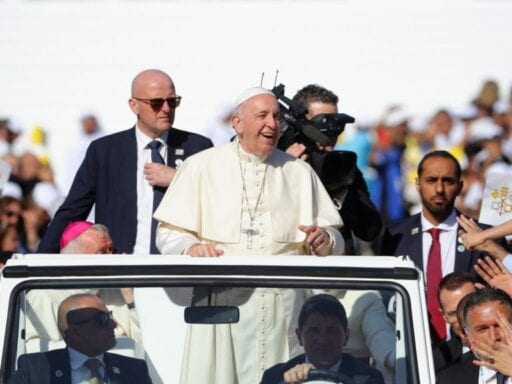The pontiff, in a first-ever visit to the Arabian peninsula, delivered a mass attended by tens of thousands, including many of UAE’s migrants.
Pope Francis celebrated a historic Catholic mass in the United Arab Emirates on Tuesday — part of a landmark trip that saw the first-ever papal visit to the Arabian Peninsula, the birthplace of Islam.
UAE officials say that Francis’s public mass at Zayed Sports City Stadium in the capital city of Abu Dhabi drew about 4,000 Muslims and about 135,000 people total — many of them Catholic migrants from places such as the Philippines and South America. They’re part of a large migrant community in the oil-rich country that works building gleaming new towers or as domestic help, often under harsh or discriminatory conditions.
Pope Francis, who has been under pressure over priest sexual-abuse scandals in the Catholic Church, delivered a message of humility and faith to the crowds that came to hear his mass (delivered in Italian and translated to Arabic and English) or to cheer on the pontiff as he made the rounds in his Popemobile.
Video: Pope Francis arrives at Abu Dhabi Mass in Mercedes Benz ‘Popemobile’ G-Wagen.
_______________#PopeFrancisInUAE #البابا_فرنسيس_في_الإمارات pic.twitter.com/AjUHrpMTwQ— The National (@TheNationalUAE) February 5, 2019
“Let us look at how Jesus lived: poor in respect to things, but wealthy in love; he healed so many lives, but did not spare his own,” Pope Francis said in his homily. “He came to serve and not to be served; he taught us that greatness is not found in having but rather in giving.”
Pope Francis’s visit and his mass were a remarkable and very public show of Catholic faith in a region that is not particularly known for religious tolerance.
The UAE is more tolerant of different religions than some of its neighbors in the Gulf, particularly Saudi Arabia. Though the UAE’s constitution establishes Islam as the country’s official religion, it also “guarantees freedom of worship as long as it does not conflict with public policy or morals,” according to a 2017 State Department report. Christian churches as well as Hindu and Sikh temples operate on land donated by the ruling family, the State Department report notes.
But the country is still far from a bastion of religious freedom. There are strict laws against proselytizing by non-Muslims; blasphemy and converting from Islam are strictly prohibited and those who do so face harsh punishments, potentially including the death penalty. Anti-Semitic literature and sentiment is prevalent, particularly on social media, and discrimination against followers of the minority Shi’a sect of Islam is not unheard of.
The UAE has dedicated this year to “tolerance,” promoting openness to people and cultures from around the world. (There’s even a Minister of Tolerance.) Pope Francis’s visit seemed to fit squarely with this campaign, as well as within the pontiff’s own outreach to the Muslim world.
But although it is certainly a historic moment and a positive step on the path toward greater tolerance and dialogue, particularly between the Muslim and Christian faith communities around the world, some critics saw Francis’s visit as giving the UAE cover — helping to gloss over both its still-stringent religious restrictions and its mistreatment of migrants, who are largely denied the possibility of citizenship.
The UAE, along with its coalition partner Saudi Arabia, is also perpetrating violence in Yemen, the site of the world’s most devastating humanitarian conflict.
Pope Francis did speak out against conflict in the region, including the war in Yemen. On Monday, in front of an audience of Emirati and other religious leaders, Pope Francis signed a statement on “human fraternity,” promoting peace among nations, races, and religions, with Sheikh Ahmed al-Tayeb, the Grand Imam of Egypt’s Al-Azhar mosque, who hosted Pope Francis in 2017.
In his remarks, the pontiff condemned violence, saying, “War cannot create anything but misery; weapons bring nothing but death.”
He added: “I am thinking in particular of Yemen, Syria, Iraq, and Libya.”
Just ahead of his visit to the UAE, Pope Francis called on worshippers at a Sunday mass in Vatican City to “pray hard” for Yemen, “because there are children who are hungry, who are thirsty, who have no medicine, and are in danger of death.”
This was seen as a not-so-subtle rebuke to his soon-to-be hosts, though he was a bit more measured once he arrived in the UAE. But on his return form the UAE, Pope Francis told reporters that he found “good will to start peace processes” in Yemen.
Pope Francis didn’t go into any specific details on such a peace process, but visit is still a symbolic milestone for the region, and for the UAE and its growing Catholic population.
Author: Jen Kirby
Read More



